The tragedy of people left behind bars
(Baonghean.vn) - Poverty, illiteracy, limited legal awareness... are the main reasons leading many ethnic minorities in mountainous districts to commit crimes and get caught up in the law. Counting down the days and months behind bars, many people are abandoned, without family visits or records, they live on the current prison regime and the kindness of prison officers...
Of the 998 inmates currently being managed and detained at the Nghe An Provincial Police Detention Center, 243 are ethnic minorities, most of whom are unemployed. Most of them are so poor that they take risks, leading to legal trouble. Many are even illiterate and cannot speak the common language. After being arrested, many inmates live on the prison's regime as prescribed, without custody or visits.
Lonely prisoners
Prisoner Cut Thi Oanh (born 1989), residing in Na Nhang village, Tien Phong commune, Que Phong district, is currently serving a sentence for “illegally trading in drugs”. Having contracted HIV in the final stages, Oanh burst into tears when confiding in us that she did not know if she could “try” to return to see her only child one last time.
Oanh’s life is a long series of overlapping tragedies, and it is even more heartbreaking when the person who caused that pain is none other than the drug addict husband that Oanh “got” when she was only 14 years old. After getting married and living under the same roof, Oanh found out that her husband was an addict, and all the assets that both families had given them to be independent had “gone away” one by one.
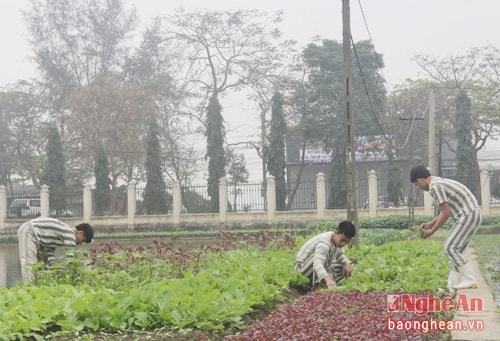 |
| Prisoners participating in reform labor at the Provincial Police Detention Center, photo by Khanh Ly |
Unable to control herself, Oanh followed her husband and became addicted without realizing it. To have money to satisfy her cravings, this woman in the form of a child started to buy drugs to sell in retail, both to have money to pay for her living expenses and to have drugs to support herself and her husband.
In 2012, Oanh was arrested by Que Phong district police and later sentenced to 24 months in prison. On her release from prison, Oanh collapsed when she learned that she had contracted HIV from her husband. Her life was once again at a dead end with no way out. Her husband died and she had no home, so Oanh returned to drug trafficking.
“Since I came here, no one has come to visit me. My father has dementia, my mother is old, and we don’t have money to travel. I don’t know how my daughter is doing now. I just hope to live until I get out of the camp to see her, but with this disease, I don’t know how much longer I can live,” Oanh burst into tears as she told about her painful reality.
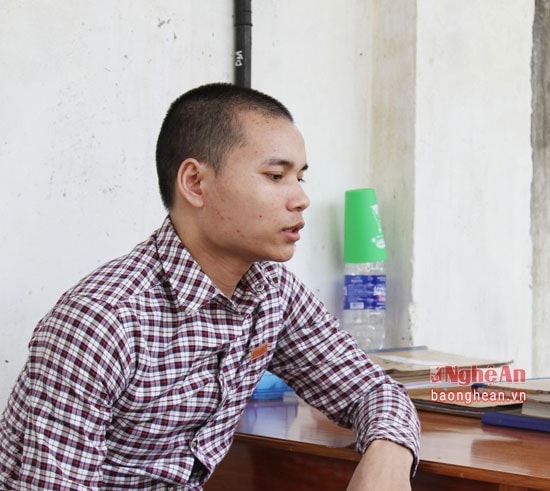 |
| Prisoner Xeo Van Thong |
Xeo Van Thong (born 1988), residing in Xop Chao village, Yen Hoa commune, Tuong Duong district (Nghe An), was sentenced to 6 years in prison for the crime of "Human trafficking" and got into trouble with the law again for a reason that, according to the prisoner himself, was because he loved people too much. After finishing 8th grade, Thong dropped out of school, stayed home, got married, and sold alcohol to make a living.
Tragedy struck in June 2015 when Thong's niece, Vi Thi Phuong (born 1999), came to express her desire to go to China to get married because she was bored with studying and often scolded by her mother at home. Unable to stop her, Thong found someone to contact to take her across the border for an agreed price of 100 million VND.
The transaction was successful, but two months later Phuong was rescued by Chinese police and returned to his hometown. Immediately, those involved were arrested, including Xeo Van Thong. That was also the only time Thong broke the law, but he had to pay a very high price.
This prisoner shared that when he was looking for someone to help Phuong go to China, he did not think that doing so was illegal. In all transactions and negotiations between Thong and the pimps, Thong asked Phuong's opinion. Even when he was arrested, Xeo Van Thong had not received a single penny from the "partner". After more than a year behind bars, Xeo Van Thong was luckier than many other prisoners when his wife visited him four times, and he had a record of it.
Also guilty of the crime of “Human trafficking”, but prisoner Tran Thi Ty (born in 1972), residing in Chon village, Xieng My commune, Tuong Duong district, is in a very special situation. Her husband passed away, Ty raised 3 young children alone, although she has served a relatively long sentence, Ty has not had a single visit.
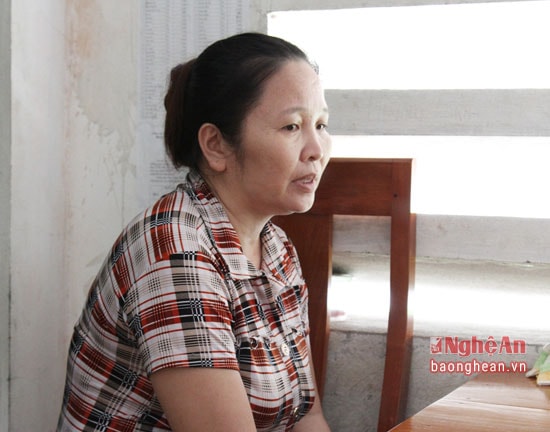 |
| Prisoner Tran Thi Ty |
Previously, Ty was sentenced to 26 months in prison for “illegally buying and selling drugs” in 2012, serving his sentence at Dong Son Prison (Quang Binh). Like Thong, in November 2015, two people from the same village “asked” Ty to take them to China to find work and this woman enthusiastically helped, with a promised reward of 2 million VND/person if they passed through successfully.
Finding a source to sell for 80 million VND per person, Tran Thi Ty gave the "goods" to a strange woman to take to Quang Ninh. However, in Mong Cai, this "human cargo" was discovered and arrested by the authorities. Upon learning the news, Ty quietly went to the police station to surrender.
Sad fate behind bars
There are many cases where from the time of detention until the end of the sentence, or many years in solitary confinement (for death row inmates), no relatives once visited or provided with supplies. Having graduated from university but unemployed after graduation, his wife had ovarian cysts, almost unable to have children, Ha Ba Hua (born in 1989), residing in Pu Quat 2 village, Na Ngoi commune, Ky Son district, fell into a drug trafficking ring from Laos to Vietnam.
For each successful shipment, Hua received 2,000 USD. After 4 times as a transporter, Hua brought back from Laos 20 heroin bars, and in 2015, while trading 8 heroin bars in Xuan Son commune, Do Luong district (Nghe An), he was caught red-handed and sentenced to death.
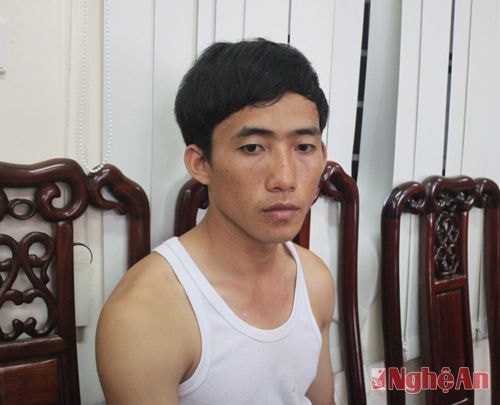 |
| Prisoner Ha Ba Hua |
The only time Hua was able to see his wife and relatives was at the first instance trial. Since then, this prisoner has not been visited once. Consoling himself that his wife was seriously ill, his mother was old, and the road was long, death row inmate Ha Ba Hua could only accept his fate without a word of complaint. Because, after all, today's bitter ending was due to his own mistakes in the past, brought upon himself. More than anyone, Hua understood very well that his actions were illegal, but because of poverty, this former student blindly took the plunge.
Ha Ba Hua's case is also a common situation for 22 death row inmates who have been held in solitary confinement at Nghe An Provincial Police Detention Center. For death row inmates who are ethnic minorities or Laotians, almost from the time of detention until the time of execution, no one visits them and the prison officers have nicknamed them "lonely death row inmates".
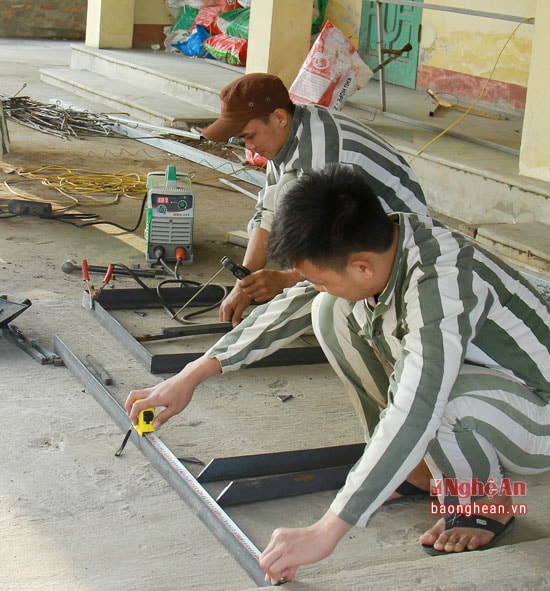 |
| Prisoners are being reformed at the detention camp of Nghe An province police. |
For these people in particular and prisoners abandoned by their families, prison officers deduct a portion of their monthly salary to buy them necessary items, or buy them a box of instant noodles, some sugar or a carton of milk.
Captain Nguyen Thi Lien, a prison officer with many years of experience in contacting and taking care of death row inmates as well as ethnic minority inmates, said: Many inmates, when entering the prison, shared that it was the first time they knew the taste of rice, because when they were at home they only ate wild vegetables and cassava. Even some female inmates who have become grandmothers and mothers, when given a boiled egg, did not know how to eat it, just fumbling around trying to "open" it. Seeing that scene, many times the prison officers could not hold back their tears of pity.
Committing a crime, for any reason, is blameworthy and deserves punishment. However, being imprisoned because of poverty and illiteracy is perhaps the greatest shame in life. The months of paying the price, counting down the time behind bars, sometimes simply wishing for a visit and encouragement from relatives, but it seems that dream is too vague and unrealistic.
More painfully, many people after entering prison, unilaterally divorce their husbands to marry other women. As bitter as it is, for many different reasons, many prisoners return to their families and society not long after, only to continue to repeat the same mistakes of the past...
Ha Thu

.jpg)



.jpg)


